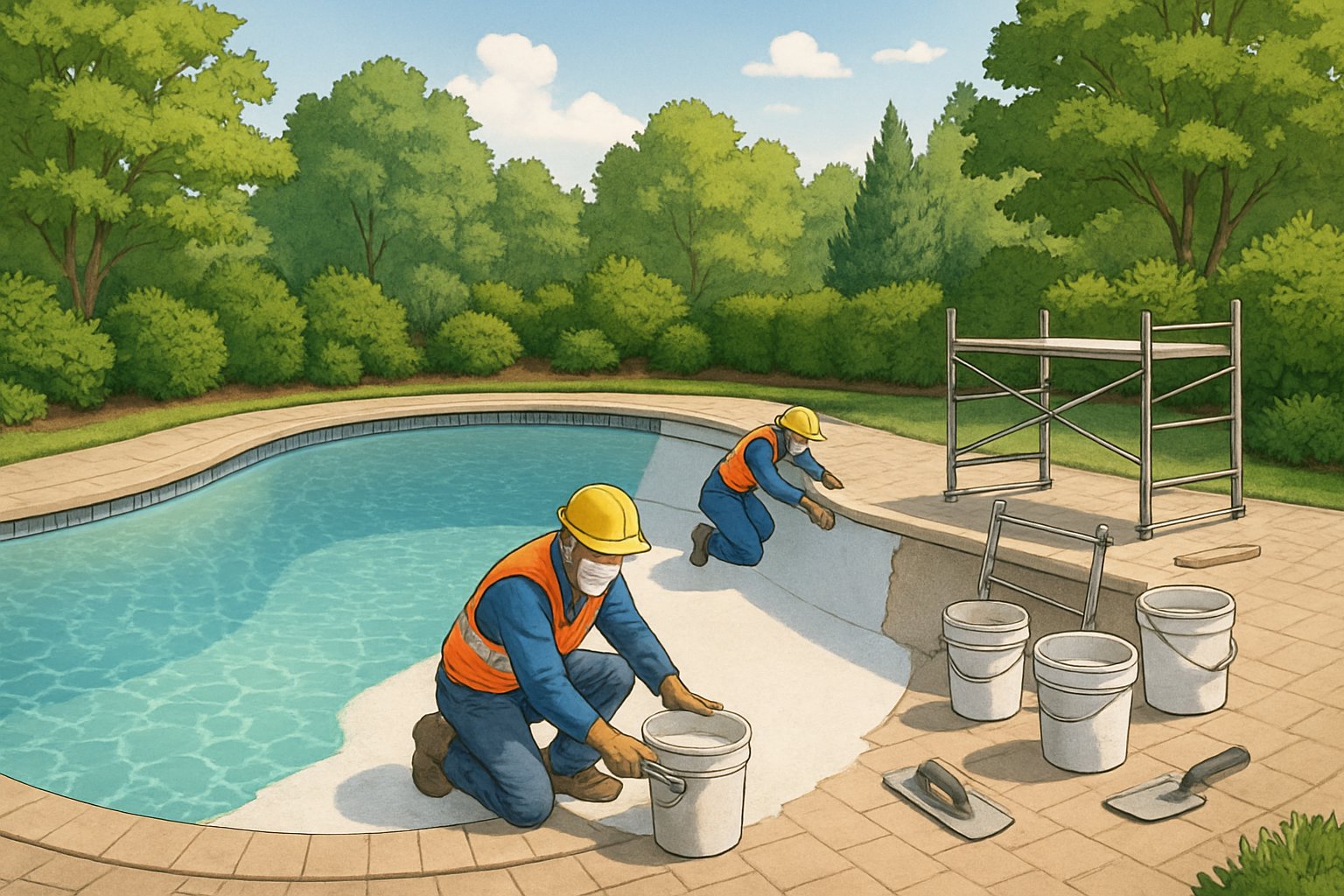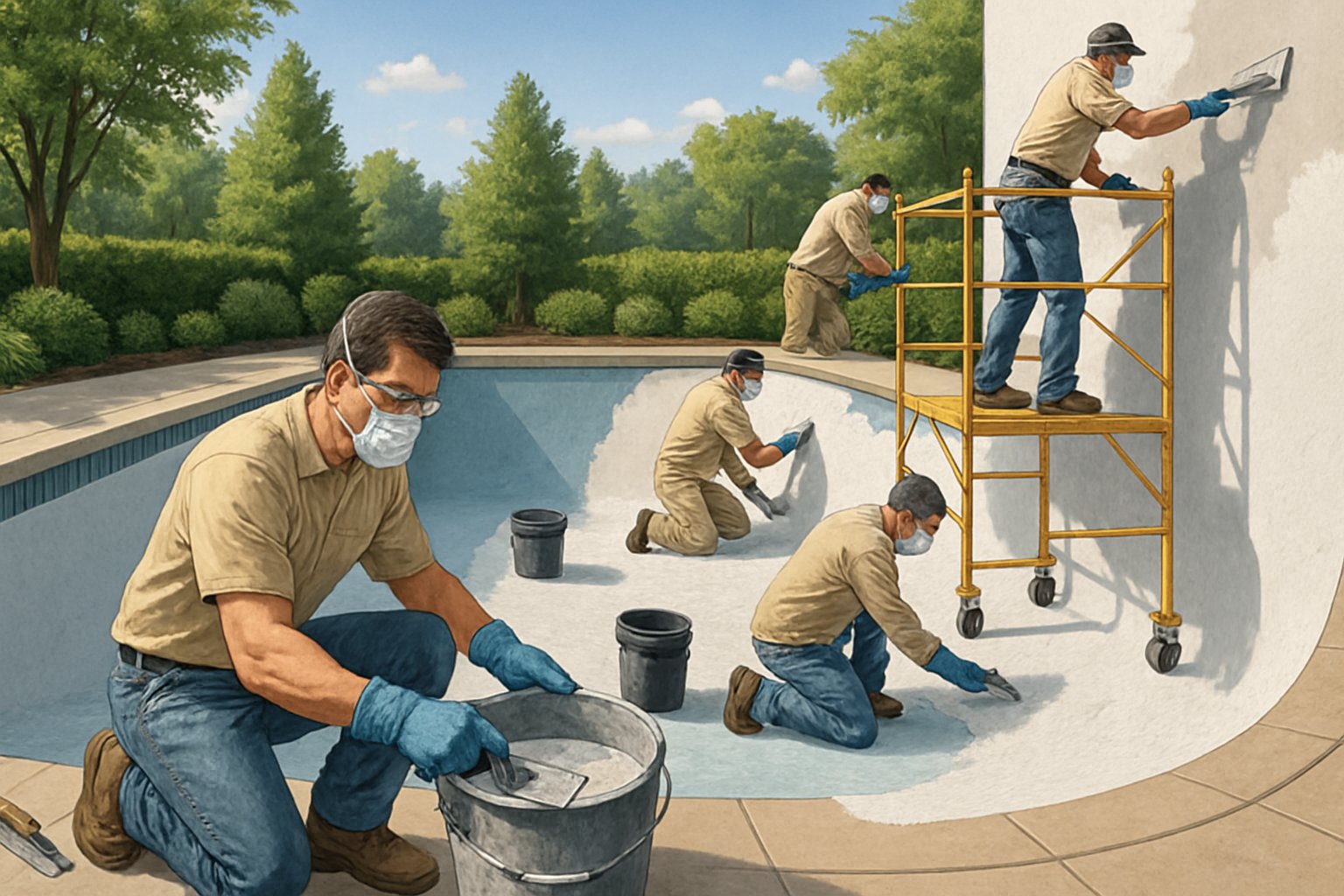Keeping your pool surface in good shape is key to enjoying a safe, beautiful swim area. Over time, pool surfaces can crack, fade, or wear down, which makes resurfacing and replastering necessary. Pool resurfacing and replastering in Virginia restore your pool’s smooth finish and help extend its life, making it both more attractive and functional.

Choosing a professional, trusted company like us at Dolphin Pool Services ensures the job is done right. We understand the specific needs of Virginia pools and use the best materials and techniques to protect your investment. Proper maintenance after resurfacing also keeps your pool looking great for years.
Whether your pool needs a fresh new look or repair to damaged plaster, expert service delivers lasting results. We are here to help you keep your pool in top condition with dependable workmanship and attention to detail.

Resurfacing and replastering are key to keeping Virginia inground pools safe and attractive. These services restore the pool’s surface, improve durability, and update its look. Choosing the right process and materials matters to extend the life of your pool and prevent costly repairs.
Pool surfaces can be concrete, plaster, pebble, fiberglass, or vinyl liners. Each type has a different texture and lifespan. Concrete and plaster surfaces are common for inground pools in Virginia. These surfaces can wear out over time due to water, chemicals, and weather exposure.
Resurfacing removes the worn or damaged layer and adds a new finish. Replastering specifically means applying a new layer of plaster, often with additives like quartz or pebble to improve strength and appearance. We recommend working with experienced pool services to avoid uneven surfaces or future damage.
Resurfacing fixes cracks, rough spots, and leaks. It also makes your pool look new again and feels smoother to the touch. This reduces the risk of injury from sharp edges or rough patches. Resurfacing improves water resistance, helping avoid leaks that can cause bigger problems around your home.
Replastering protects the pool from chemicals and heat, which can wear down the surface over time. We find that well-done resurfacing also raises your pool’s value by keeping it in top condition. Regular maintenance combined with resurfacing will lower overall costs by preventing major repairs.
There are clear signs your inground pool in Virginia may need resurfacing or replastering. Look for:
If your pool is over 10 years old and showing wear, it is a good time to consider resurfacing. Waiting too long can make repairs harder and more costly. We advise scheduling an inspection with a professional pool company like us to evaluate its condition.
Virginia pools can benefit from various resurfacing materials depending on your needs and budget. Here are common options:
| Material | Durability | Appearance | Cost |
|---|---|---|---|
| Standard Plaster | 5-7 years | Smooth, white finish | Low |
| Pebble Finish | 10-15 years | Textured, natural look | Medium |
| Quartz Additive | 8-10 years | Smooth, sparkling | Medium-High |
| Vinyl Liner | 5-9 years | Smooth, customizable | Low-Medium |
We recommend discussing your pool’s use and climate with a professional. Choosing the right finish can improve durability and reduce cleaning time. Working with an expert like Dolphin Pool Services ensures high-quality application and long-lasting results for your Virginia inground pool.

Proper care and maintenance help extend the life of your pool’s surface and equipment. Knowing when to maintain and when to call professionals is key to keeping inground pools safe, clean, and visually appealing.
Regular cleaning and chemical balance checks are essential for maintaining your pool’s surface and water quality. We recommend testing the water pH, alkalinity, and chlorine levels at least twice a week to prevent damage to plaster or liners.
Skimming debris, brushing the walls, and vacuuming the pool floor remove dirt and prevent algae growth. Equipment like pumps and filters should be inspected monthly to ensure they work well and avoid costly repairs.
Keeping water levels stable and avoiding harsh chemicals will protect the resurfaced surface. Consistent maintenance reduces wear and keeps your pool looking fresh longer.
Using a trusted professional for resurfacing and repairs ensures quality work and lasting results. We suggest choosing a company like us, Dolphin Pool Services, with experience in Virginia inground pools.
Professionals carry certified equipment, use top materials, and understand local conditions to avoid common issues like early cracking or discoloration. Licensed companies also offer warranties and background-checked staff for peace of mind.
Regular service visits from experts help catch small problems early. Experts also provide guidance on maintenance and post-resurfacing care tailored to your pool.
After resurfacing, it’s vital to follow specific care steps to protect your pool’s new surface. Avoid filling the pool immediately; wait for the plaster or material to cure properly, usually about two weeks.
During curing, keep the water balanced and brush the surface gently to prevent staining and rough spots. Avoid heavy pool use or adding harsh chemicals until fully cured.
We recommend scheduling follow-up inspections to monitor the surface condition. Professional cleaning and adjustments during this period maximize the lifespan of your new finish.

Resurfacing and replastering schedules vary based on use and materials. Costs depend on pool size, finish type, and current condition. Proper maintenance after resurfacing helps extend the life of the surface and keeps your pool looking its best.
Pools typically need resurfacing every 10 to 15 years.
This depends on factors like the quality of the original plaster, pool use, and how well it has been maintained.
Quartz and pebble finishes are popular for their durability and texture.
Light-colored plaster helps maintain cooler water temperatures in hotter climates like Virginia.
Pool size and shape directly affect material and labor costs.
The choice of finish, such as standard plaster, pebble, or tile, changes the price.
Site access and pool condition also impact the total cost.
A well-maintained pool surface adds to the home’s appeal.
It shows buyers that the pool has been cared for, potentially increasing property value.
Most resurfacing jobs take about 1 to 2 weeks.
This includes draining, surface preparation, application, and curing time.
Keep the water balanced with regular testing for pH and alkalinity.
Avoid harsh chemicals in the first few weeks as the surface cures.
Regular cleaning and proper water circulation help maintain the finish.
We recommend using experienced, reputable professionals like us at Dolphin Pool Services for resurfacing. We ensure your inground pool looks and performs at its best after any work.